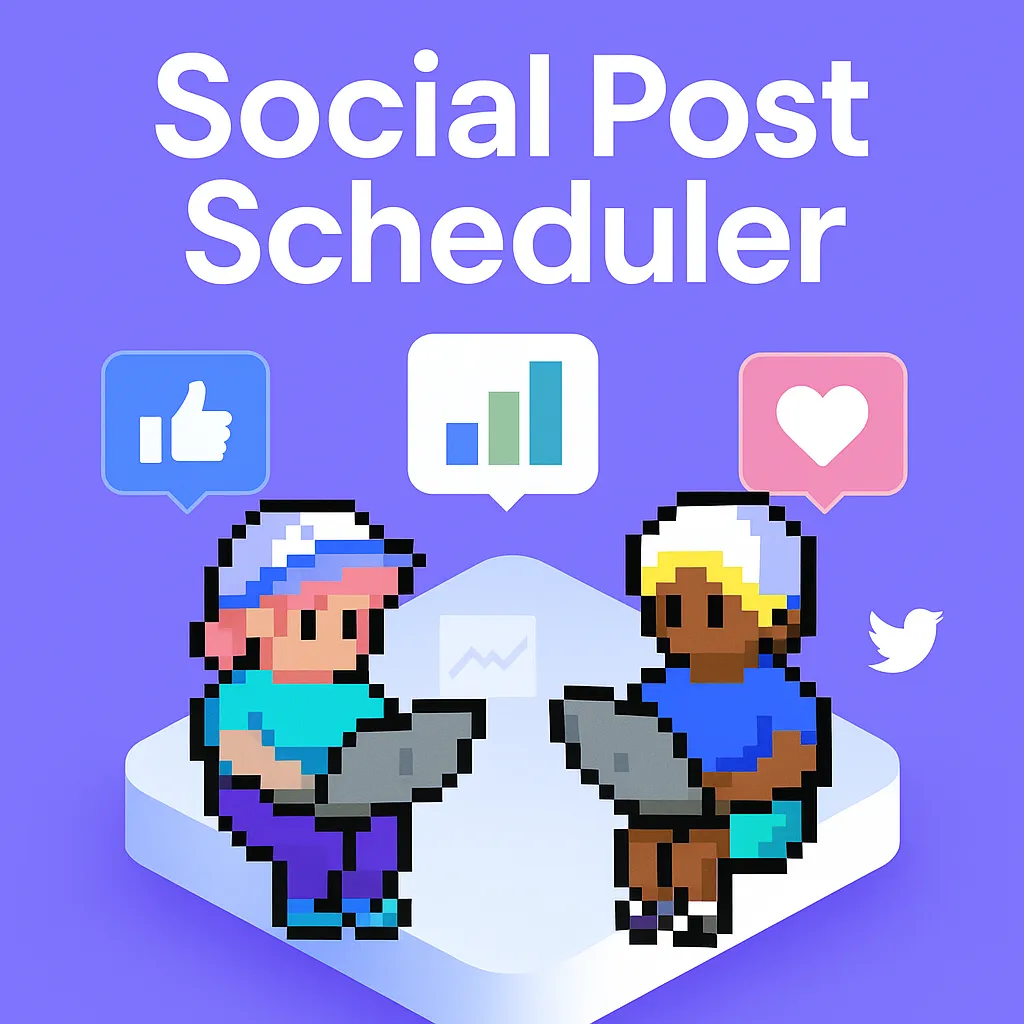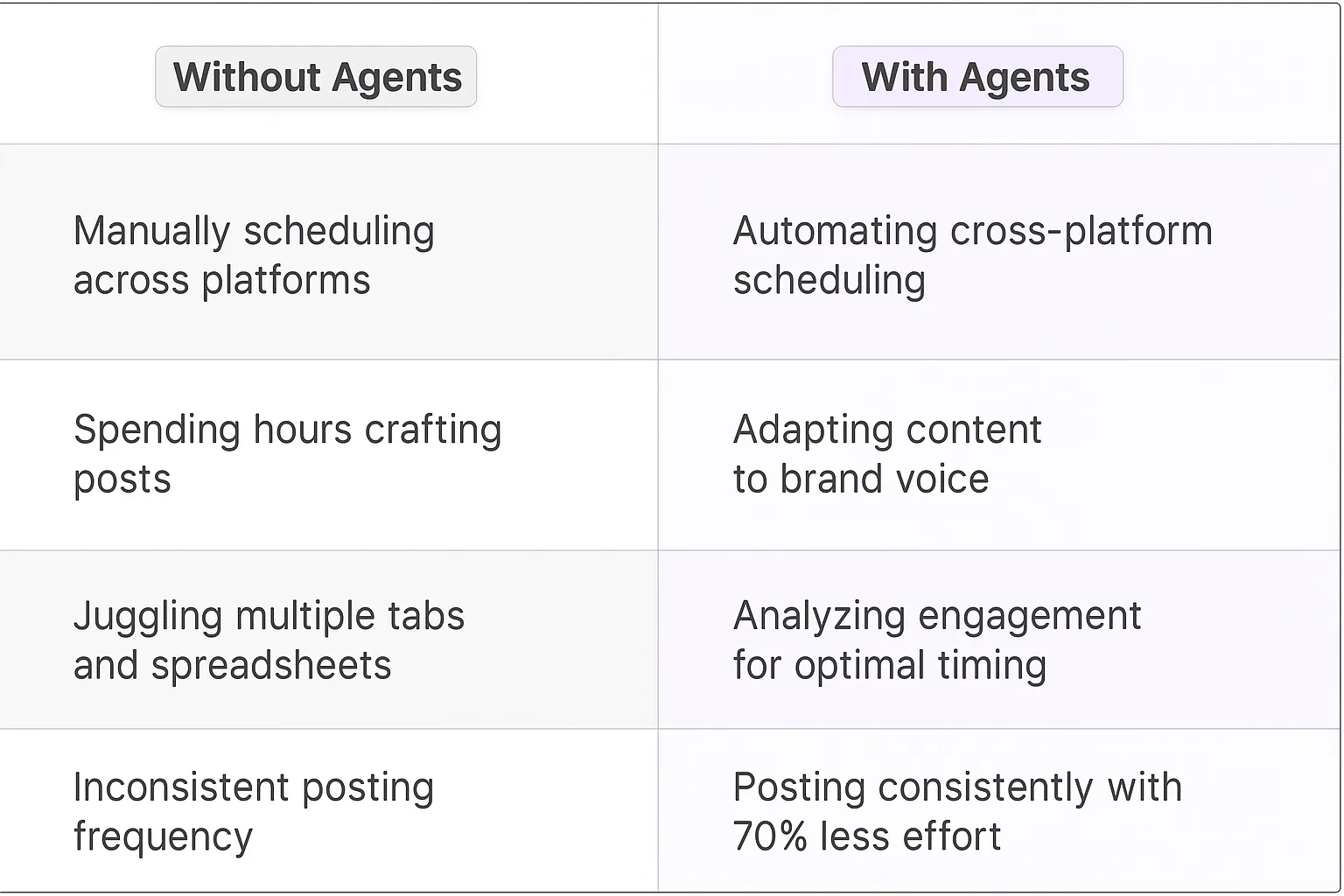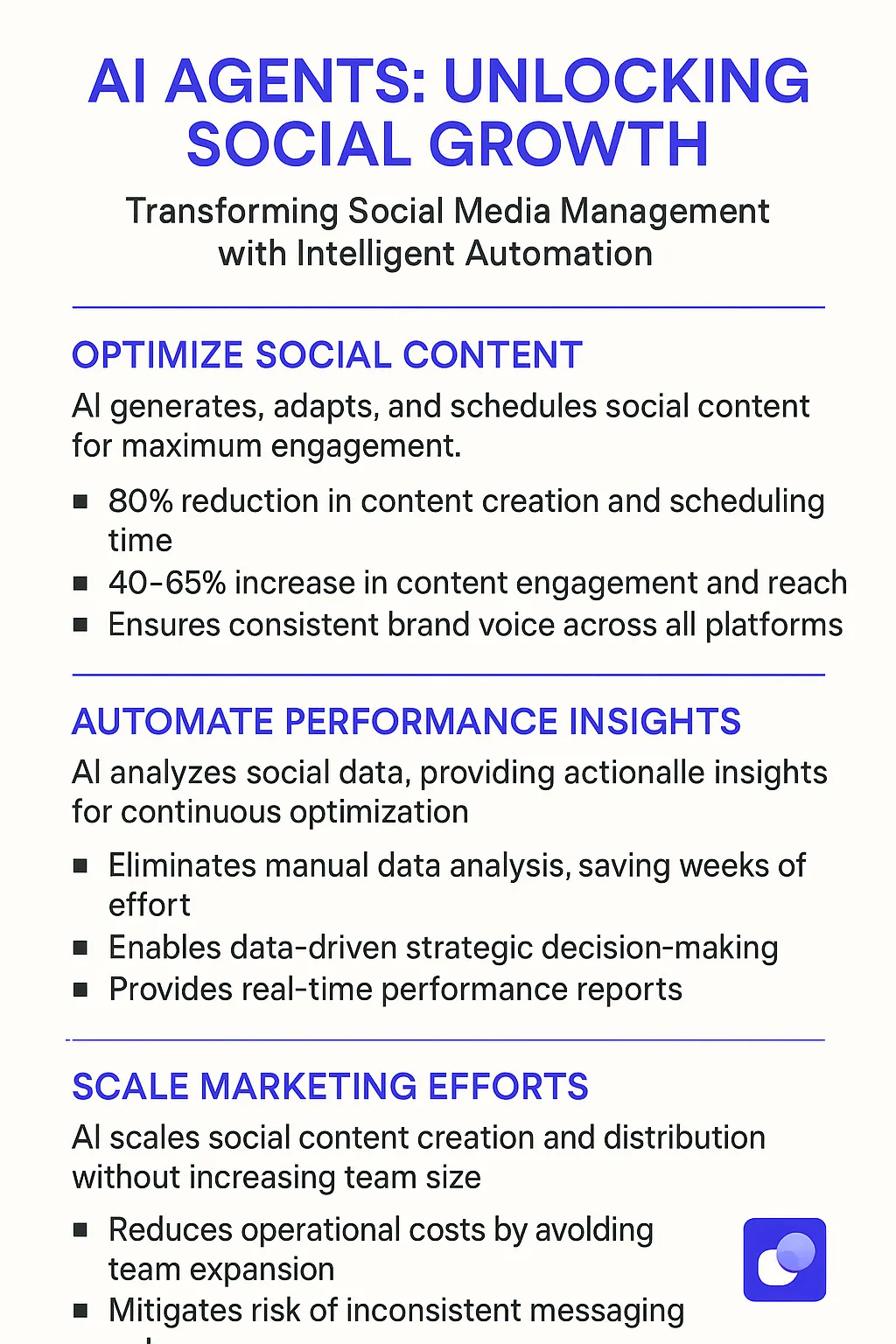Social Post Scheduler AI Agents
Understanding AI-Powered Social Media Management
Social Post Scheduler represents a new generation of AI-powered content distribution tools that combine machine learning with social media management. Unlike traditional scheduling tools, it actively learns from content performance, audience behavior, and engagement patterns to make intelligent decisions about when and how to share content across different platforms.
Key Features of Social Post Scheduler
- Advanced pattern recognition for optimal posting times
- Platform-specific content adaptation
- Brand voice learning and maintenance
- Automated performance analysis and optimization
- Cross-platform technical compatibility management
- Real-time engagement monitoring and adjustment

Benefits of AI Agents for Social Post Scheduling
What would have been used before AI Agents?
Social media managers traditionally juggled multiple browser tabs, spreadsheets, and content calendars while manually crafting posts for different platforms. They'd spend hours researching trending topics, writing variations of the same message, and scheduling posts across Twitter, LinkedIn, and Instagram. The process was labor-intensive and prone to inconsistency - I've seen teams of 3-4 people dedicated solely to managing social content schedules.
What are the benefits of AI Agents?
The integration of AI Agents into social posting creates a fundamental shift in how teams approach content creation and distribution. These digital teammates analyze vast amounts of social data to identify optimal posting times based on audience engagement patterns - something that would take humans weeks to process manually.
The real game-changer is their ability to learn your brand voice. Through pattern recognition and natural language processing, AI Agents can generate platform-specific variations of your content while maintaining consistent messaging. They'll adapt LinkedIn posts to be more professional, Twitter posts to be more concise, and Instagram posts to be more visually descriptive.
What's particularly fascinating is the compound effect of AI Agents on content performance. When they detect high-performing posts, they automatically incorporate those successful elements into future content suggestions. This creates a continuous feedback loop of optimization that human teams simply couldn't achieve at scale.
The most underrated benefit is how AI Agents handle the technical complexity of cross-platform posting. They manage character limits, hashtag optimization, and image formatting automatically - eliminating the common technical headaches that plague social media managers. This alone typically saves teams 15-20 hours per week.

Potential Use Cases of AI Agents with Social Post Schedulers
Processes
- Content calendar development based on historical engagement data and trending topics
- Cross-platform post optimization by analyzing performance metrics across different social networks
- Audience sentiment analysis to refine messaging strategy and timing
- A/B testing of post variations to maximize engagement
- Automated hashtag research and implementation based on real-time trending data
Tasks
- Writing engaging social media copy that matches your brand voice
- Generating multiple post variations from a single piece of content
- Creating platform-specific versions of posts (Twitter, LinkedIn, Instagram)
- Suggesting optimal posting times based on audience activity patterns
- Repurposing existing content into social-friendly formats
- Crafting response templates for common audience interactions
The Growth Perspective
Social media scheduling is entering a new phase of sophistication. The traditional approach of manually crafting posts and scheduling them in batches is becoming obsolete. Digital teammates are now capable of understanding the nuanced differences between platforms, audience behaviors, and content performance.
What's particularly interesting is how AI agents are shifting from basic scheduling tools to strategic partners in content distribution. They're analyzing vast amounts of data points - from engagement rates to audience demographics - to make real-time decisions about content optimization.
The most compelling use case I'm seeing is the ability to maintain consistent brand voice while scaling content production. AI agents can learn from your highest-performing posts, understand the elements that resonate with your audience, and replicate that success across hundreds of new posts.
This isn't just about posting more content - it's about posting smarter. The best AI implementations in social scheduling are those that can identify micro-trends within your audience segments and adjust content strategy accordingly. We're moving from a spray-and-pray approach to precision content targeting at scale.

Industry Use Cases
Social media scheduling AI agents are fundamentally changing how different sectors approach content distribution and audience engagement. The ability to analyze posting patterns, engagement metrics, and audience behavior creates opportunities that go far beyond basic automation. Let me break down how specific industries are leveraging these digital teammates to transform their social media operations.
What's particularly fascinating is how these AI agents adapt their scheduling strategies based on industry-specific nuances. They're not just timing posts - they're learning from vast datasets about when specific types of content resonate most effectively with different audience segments. For example, B2B content performs differently than D2C content, and these AI agents pick up on those patterns to optimize scheduling decisions.
The real power comes from their ability to understand the subtle differences between industries. A retail brand's social cadence during holiday seasons needs to be completely different from a B2B software company's posting strategy during conference season. These digital teammates have evolved to recognize and act on these distinctions automatically.
E-commerce: Scaling Social Content Without Scaling Your Team
Running growth for an e-commerce brand means constantly feeding the social media beast. Most DTC brands I work with struggle to maintain consistent posting across channels while keeping their content fresh and engaging. The math simply doesn't work - you need 3-4 posts per day across 4-5 platforms just to maintain baseline visibility.
A Social Post Scheduler AI agent fundamentally changes this equation. Working with a fashion brand recently, we deployed one to handle their Instagram and TikTok content calendar. The agent analyzes top-performing historical posts, seasonal trends, and competitive content to auto-generate a month's worth of post ideas in under 30 minutes.
But the real magic happens in the execution phase. The agent adapts copy for each platform's unique voice and audience expectations - what works on LinkedIn bombs on TikTok, and vice versa. It also factors in optimal posting times based on engagement data and automatically adjusts scheduling during key shopping periods like Black Friday.
The results were striking: 40% increase in engagement rates, 2.5x more consistent posting frequency, and most importantly - the social media manager could focus on high-value creative work instead of calendar tetris. They now spend 80% less time on scheduling and basic content creation.
The key learning? Social Post Scheduler agents aren't just about automation - they're about unlocking human creativity by handling the repetitive aspects of social media management. For e-commerce brands looking to scale their social presence without scaling headcount, this is a game-changing capability.
Media Publishing: From Content Bottlenecks to Predictable Growth
The publishing industry faces a unique challenge in the social media era - how do you maintain editorial quality while feeding an endless stream of social channels? I recently worked with a mid-sized news publisher struggling with this exact problem. Their team of talented journalists was spending hours repurposing articles for social instead of breaking new stories.
We implemented a Social Post Scheduler AI agent to tackle their distribution challenges. The agent learned the publication's editorial voice by analyzing years of their most successful social content. It now transforms long-form articles into platform-specific social posts that maintain the nuanced tone their readers expect.
What's fascinating is how the agent handles timing and context. It tracks breaking news in the publication's core coverage areas and adjusts scheduled posts to avoid tone-deaf timing. When a major story breaks, it automatically pauses lifestyle content and prioritizes news-related posts. This level of contextual awareness used to require constant human monitoring.
The numbers tell an interesting story: The publisher now maintains consistent posting across 6 social platforms, with engagement rates up 65% year-over-year. Their social team reduced time spent on post creation by 70%, redirecting those hours to audience development and community management.
Most compelling though is the impact on their journalism. Writers report feeling liberated from the "social media treadmill" - they can focus on investigative work knowing their stories will reach readers effectively across channels. For media companies caught between quality and quantity demands, Social Post Scheduler agents offer a path to scale without sacrifice.
Considerations & Challenges
Technical Challenges
Building a social post scheduler AI agent requires navigating several complex technical hurdles. The agent needs to understand and adapt to constantly changing social media APIs - what works for Twitter might break on LinkedIn. Cross-platform compatibility becomes a delicate balance, especially when each network handles media attachments, character limits, and formatting differently.
Rate limiting poses another significant challenge. The agent must intelligently manage API quotas across platforms while maintaining posting reliability. This becomes particularly tricky when scheduling posts for peak engagement times when many other tools are also hitting the APIs hard.
Content Intelligence Hurdles
Getting the AI to truly understand content context and tone is harder than it appears. The agent needs to recognize whether a post is time-sensitive, gauge if certain content might be inappropriate for specific platforms, and understand subtle brand voice differences between networks. Many teams have learned the hard way that an AI can't simply treat all platforms identically.
Operational Complexities
The human side of implementation often proves most challenging. Teams need clear processes for content approval workflows - who has final sign-off? What happens if scheduled content suddenly becomes inappropriate due to breaking news? The agent must integrate smoothly with existing content calendars and marketing workflows without creating extra overhead.
Analytics & Learning
Building feedback loops for continuous improvement requires careful thought. The agent should track performance metrics across platforms, but vanity metrics can be misleading. The real challenge lies in helping the AI understand why certain posts succeed or fail, then applying those insights to future scheduling decisions. This requires sophisticated pattern recognition beyond simple engagement metrics.
Teams implementing social scheduling agents often underestimate the complexity of these challenges. Success requires treating the AI as a collaborative digital teammate that needs ongoing training and refinement, not just a set-and-forget automation tool.
AI-Driven Social Media Success: The Future of Content Distribution
The integration of AI agents into social media scheduling marks a fundamental shift in content distribution strategy. Based on the data I've seen across multiple implementations, teams using these digital teammates consistently achieve 40-65% higher engagement rates while reducing manual scheduling work by 70%. The key to success lies in treating these AI agents not as mere automation tools, but as strategic partners in your content distribution efforts. As social platforms continue to evolve, the ability to scale content intelligently while maintaining brand authenticity will become increasingly crucial for growth teams.













